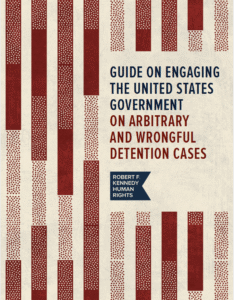Ashley Collins is the Pinto Summer Associate at Robert F. Kennedy Human Rights. She is a rising second-year student at Georgetown Law.
Undoubtedly, the COVID-19 pandemic has brought unprecedented difficulties for governments and communities in all parts of the world. Human rights defenders (HRDs) who work on behalf of historically marginalized communities — including Afro-descent communities, indigenous groups, and women, among others — now find themselves more vulnerable to violence and attacks than ever before, in addition to facing the new coronavirus. The pandemic does not change States’ fundamental obligation to protect HRDs, and governments’ inability or unwillingness to adequately respond to HRDs’ increased vulnerability in the current moment is indicative of long-standing failures on this front.
During the pandemic, some of the violence against HRDs has been overt; in El Salvador, Mexico, Venezuela, and other countries, HRDs have been threatened, arrested, and attacked as a result of their work on issues related to the pandemic and otherwise (COVID-19 has also been used as a pretext for attacking HRDs for their work on other issues). However, beyond these explicit efforts to silence them, there are also more insidious ways in which COVID-19 measures have rendered HRDs vulnerable. Lack of mobility as a result of curfews and quarantines, for example, has become a threat to HRDs’ security in countries like Colombia, where at least 37 social leaders have been killed. Having to remain in one place for long stretches of time results in increased vulnerability because those who would seek to harm these individuals now know exactly where they will be at all times. Moreover, because HRDs’ work has shifted online as a result of lockdowns, they have increasingly become the targets of digital surveillance, harassment, and attacks.
Even in countries with State protection programs in place for HRDs and journalists where there is arguably more support for the right to defend rights, the situation has worsened. Colombia and Guatemala have both seen alarming rises in the number of attacks against defenders during the pandemic. In Guatemala, the number of attacks against HRDs in the first five months of 2020 alone was roughly equal to 80 percent of the documented attacks in all of 2019. The need to protect HRDs in Colombia has even garnered the attention of members of the United States Congress.
COVID-19 has only exposed the preexisting inadequacy of these protection mechanisms. They rest on an uneasy foundation — impunity for crimes against HRDs remains the norm, states lack adequate resources to properly implement programs, and the configurations of these programs often rely too heavily on reactive protection measures, as opposed to preventive steps. Now in the midst of COVID-19, the number of bodyguards that are assigned to HRDs has been reduced in some instances; security checks of the locations in which they are being housed are no longer possible; individuals cannot be moved to a new location when they receive new threats; and HRDs have in some cases been left out of the list of exceptions to mobility restrictions that would allow them to continue their work. There is already evidence that at least one defender in Colombia was killed following a reduction in his protective measures.
Thus, while the overt attacks on HRDs during the pandemic are alarming and require international attention and a swift response, the subtler impacts of pandemic measures must also be tackled. The shortcomings that COVID-19 has revealed require proactive, rather than reactive, solutions. Security for HRDs must comprehensively address the existing social inequalities, persistence of impunity, and restrictions on fundamental rights that make these individuals vulnerable in the first place.
The work of human rights defenders is vital to the preservation of democratic societies and must be treated as such. The lessons from Latin America, which arguably has more robust HRD protections than other regions, are clear. In order to protect the right to defend rights, especially in the time of COVID-19, states must address the underlying conditions threatening HRDs’ work, not just the symptoms.




